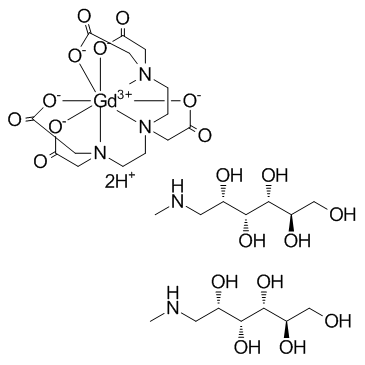86050-77-3
| Name | gadopentetate dimeglumine |
|---|---|
| Synonyms |
Meglumine gadopentetate
Gadopentetic acid dimeglumine salt Gadolinium-DTPA GADOPENTETATE DIMEGLUMINE 2-[bis[2-[carboxylatomethyl(carboxymethyl)amino]ethyl]amino]acetate,gadolinium(3+),(2R,3R,4R,5S)-6-(methylamino)hexane-1,2,3,4,5-pentol Gd-DTPA Dimeglumine-gadolinium-dtpa Magnevist Gadolinium (bis{2-[(carboxylatomethyl)(carboxymethyl)amino]ethyl}amino)acetate - (2R,3R,4R,5S)-6-(methylamino)-1,2,3,4,5-hexanepentol (1:1:2) Gadopentetate dimeglumine (JAN/USP) Gadolinium dtpa Diethylenetriaminepentaacetic acid dimeglumine salt gadolinium chelate |
| Description | Gadopentetate dimeglumine (SH-L-451A) is used in combination with magnetic resonance imaging (MRI) to allow blood vessels, organs, and other non-bony tissues to be seen more clearly on the MRI. |
|---|---|
| Related Catalog | |
| In Vitro | Gadobenate dimeglumine-enhanced MRI significantly improves cancer detection compared to gadopentetate dimeglumine-enhanced MRI, mammography, and ultrasound in a selected group of patients undergoing breast MRI for preoperative staging or because of inconclusive findings at conventional imaging[1]. Interstitial MR lymphography with gadopentetate dimeglumine (Gd-DTPA) or gadoxetate disodium (Gd-EOB-DTPA) allows clear visualization of the lymphatic pathway in healthy mice, and no significant difference is found between the two agents. Their rapid kinetics limits the imaging timing window, however, facilitates repeated assessment in a single imaging session[2]. Direct visualization of spilled gastrointestinal gadopentetate dimeglumine helps discriminate ischemic from control rats in this model[3]. |
| Animal Admin | Rats: Twenty-eight rats are anesthetized and midline laparotomy is performed. Animals are divided into four groups: control, ligation of a single mesenteric arcade, ligation of six consecutive arcades, and ligation of the anterior mesenteric artery (analogous to the superior mesenteric artery in humans). A 1.0-mL enteric bolus of gadopentetate dimeglumine diluted with sterile water (1:1) is given via gavage. Magnetic resonance imaging is performed 2 hr after laparotomy and reviewed for the presence of intraperitoneal gadopentetate dimeglumine by two experienced observers. Animals are sacrificed 24 hr after surgery for pathologic examination[3]. Mice: MR lymphography are performed after the subcutaneous injection of gadopentetate dimeglumine (Gd-DTPA) or gadoxetate disodium (Gd-EOB-DTPA) (0.1, 0.5, or 2.0 mmol per mouse) into the right footpad in six healthy mice, and the time courses of contrast enhancement are assessed. Additionally, the lymphatic pathways from two distinct sites are assessed in tandem by interstitial MR lymphography studies[2]. |
| References |
| Molecular Formula | C28H54GdN5O20 |
|---|---|
| Molecular Weight | 938.000 |
| Exact Mass | 938.260315 |
| PSA | 389.58000 |
CHEMICAL IDENTIFICATION
HEALTH HAZARD DATAACUTE TOXICITY DATA
|
